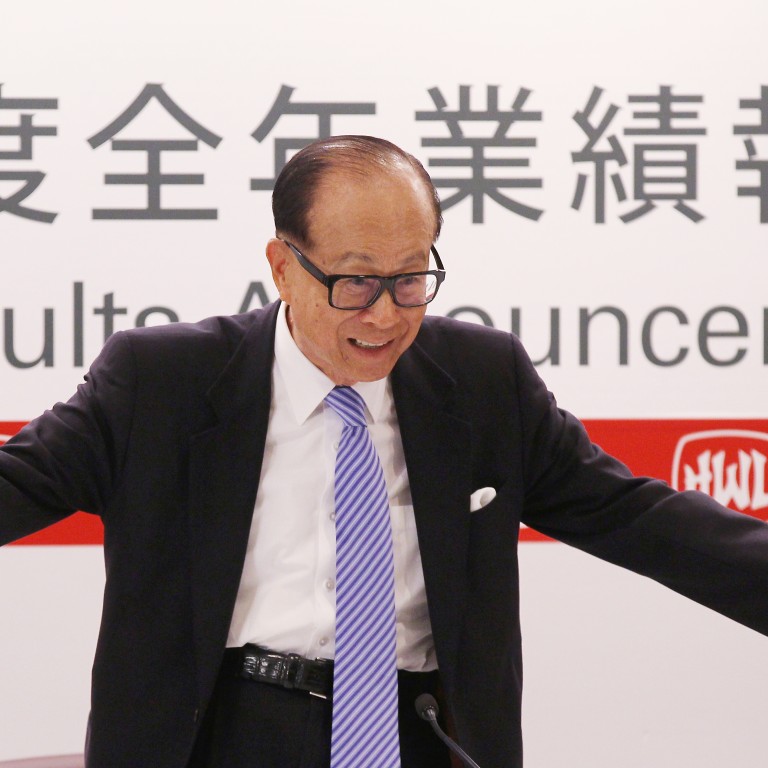
Li Ka-shing plans to make a killing as he cuts corporate ties with HK
Li Ka-shing is cutting his last corporate ties with Hong Kong and, as always, making a killing.
The final episode of his well-planned exit from the city came this week with a proposal by Cheung Kong Infrastructure (CKI) to take over Power Assets Holdings (PAH).
PAH, the electricity giant with colonial roots, is the last Hong Kong-incorporated listed entity in Li's empire following the major restructuring early this year of his companies.
If taken over by the Cayman-island incorporated CKI, all of the pieces in the Li empire's chess board would effectively be foreign.
The proposed takeover plus the restructuring in the past years will allow the Li family much greater control over PAH, a major cash cow within the empire. The company's cash level currently stands at HK$67 billion.
The cashing-out began in late 2013. Within months of the swearing in of Chief Executive Leung Chun-ying, PAH announced the spin-off of Hong Kong Electric, which supplies power to the island. However, the way the company spun the move, it was basically a 51 per cent liquidation of one of Li's major assets in the city.
It is no secret that the new leadership in Beijing and Hong Kong are much less "tycoon-friendly" compared with their predecessors and Li has of late been disposing of assets in both Hong Kong and the mainland.
The spin-off brought in HK$56 billion in cash and HK$19 billion in profit. Contrary to shareholders' expectations, PAH declared no special dividend, insisting that the money was needed for expansion. It makes every sense for Li to sit on the money. Back then, his indirect control - through layers of companies in between - in the power giant was only 6.3 per cent. The layers were there to shield his empire from hostile takeovers and debt disclosure, which was much needed during his buying spree.
The hunter is patient. In June, Li restructured his empire into property and non-property arms. From that, his family has not only got a direct ownership in the non-estate arm - Cheung Kong Holdings, which is a much internationalised growth engine - but also boosted its stake from 22 per cent to over 30 per cent.
The latest takeover proposal puts the final touches to this agenda.
CKI maintains the marriage with PAH will strengthen its financials and increase public float. That is true. What it did not say is that by raising CKI's stake in PAH from 39 per cent to 100 per cent, the indirect control of Cheung Kong Holdings in the power giant will grow from 29 per cent to 49 per cent.
Therefore, the Li family's stakes in the cash cow will more than double from 6.3 per cent to 14.7 per cent. That, at a time when many of PAH projects are mature enough to be milked.
No wonder, Li is now promising a special dividend of HK$5 per share, totalling HK$19 billion, and a higher 2015-2016 dividend to all CKI and PAH shareholders should the deal go through.
He needs the sweeteners to convince PAH shareholders to vote for the takeover. After all, this is a deal that will cut the shareholders' entitlement to the cash pile. He also needs a more generous dividend policy to put the milk somewhere else. These explain the timing of the takeover.
It comes at a time when PAH is significantly underperforming CKI. In the past 12 months, PAH has seen a negative return of 7 per cent while CKI's has increased 16 per cent.
The reality is CKI is offering to acquire PAH with a share swap instead of cash. Therefore, the wider the gap, the lower the swap ratio and the higher Li's indirect control over the cash pile.
The result is hardly a generous deal. PAH shareholders were offered 1.04 CKI shares for every share they own in the power giant. That is the market price, with no premium.
Analysts called it cheap, suggesting 1.21 CKI shares would reflect the cash pile better. But that will bring indirect control of Cheung Kong Holdings and the Li family in the cash cow to 41 per cent and 12.5 per cent respectively.
There is little chance that the superman, known for his knack for buying low and selling high, will compromise.
The fact is, a higher dividend is a good lure to PAH shareholders, including many pension funds.
Yes, this is a case of wooing kids with their own candies, but this is not the first time Li has worked such magic.

